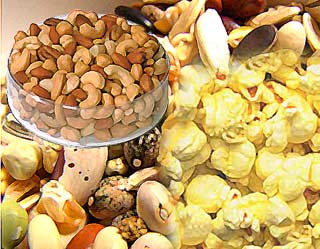
Scientists used data from the ongoing Harvard School of Public Health study of male health professionals to examine the association of eating nuts, corn, and popcorn with diverticular disease. They analysed 47,228 study participants between the ages of 40 and 75 at enrollment. These volunteers had no history of diverticulosis, diverticulitis, or related diverticular complications. Every few years these men completed detailed questionnaires designed to examine the foods they ate and their health status.
“It is not exactly clear where this idea came from because there are no studies showing this to be the case. It just became a part of medical lore. This disorder is found in industrialized, western nations — nations where diets have low dietary fiber. In Africa and Asia it is very uncommon†mentioned Researcher Lisa L. Strate, MD, MPH, of the University of Washington school of medicine in Seattle,
She further added, “We found, contrary to current recommendations, that actually, consumption of these foods did not increase the risk of diverticulitis or diverticular bleeding and didn’t appear to increase the risk of developing diverticulosis or its complicationsâ€
Reviewing medical records and diet interviews over an 18 year study period, the team found that there were 801 new cases of diverticulitis and 383 new cases of diverticular bleeding. They discovered that men who consumed nuts twice a week or more had a 20 % lower risk of diverticulitis than those who ate them less than once a month. The study showed that while patients who ate the most popcorn had a 28 % lower risk of diverticulitis compared to men with the lowest intake, also intake of corn had no link whatsoever.
Scientists thus assert that nuts, popcorn, and corn may actually decrease the Complications of Diverticular Disease
According to the National Institutes of Health about a third of Americans will develop small pouches of the colon by the time they reach age 60. With two-thirds having the pouches by age 85, millions of Americans are victims of the uncomfortable intestinal disorder. Often there are no particular symptoms for diverticulosis, but it is characterized by intense pain in the lower, left side of the abdomen and possible nausea, vomiting, cramping, and bleeding.
Believing that the findings may probably apply to women too, scientists advise reconsideration of earlier dietary recommendations. They however have a word of caution that this study was the sole study to disassociate nuts with diverticular disease.

